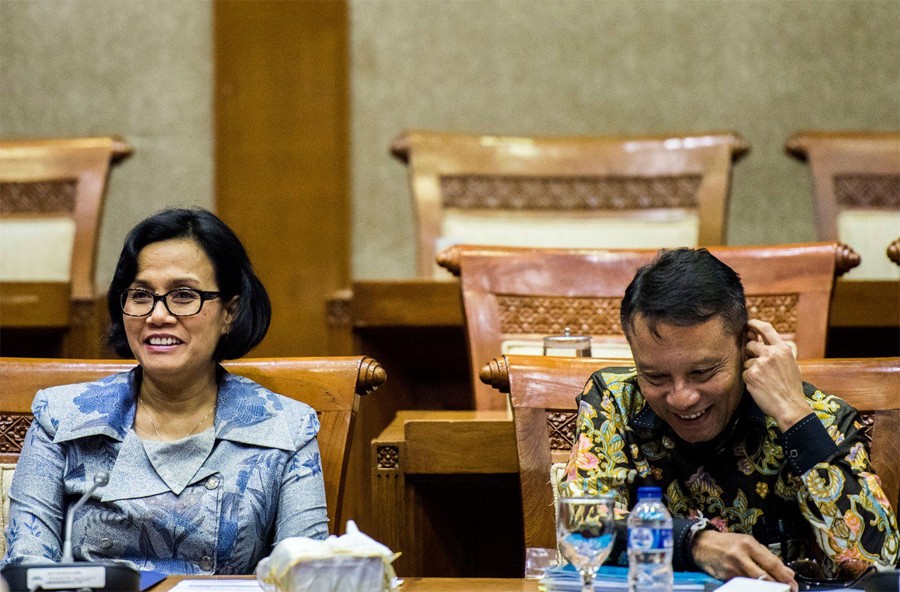Start with regulation, end with celebration
It is also very important to remind ourselves that any discussion on the tax system should start with the end goal in mind — what we as a nation want to achieve through taxation, such as promoting economic growth and reducing inequality.
Change Size
 Finance Minister Sri Mulyani Indrawati (left) and director general of taxation Ken Dwijugieasteadi attend a meeting with House of Representatives Commission XI in Jakarta on Oct. 12. (Antara Photo/M Agung Rajasa)
Finance Minister Sri Mulyani Indrawati (left) and director general of taxation Ken Dwijugieasteadi attend a meeting with House of Representatives Commission XI in Jakarta on Oct. 12. (Antara Photo/M Agung Rajasa)
C
urrently a revision to the tax code is being prepared and some people have pushed for the revision to be enacted as soon as possible. To rush the laws would be a mistake since this is a rare opportunity to fundamentally reform the tax system. Therefore, care must be taken with in-depth studies backed by valid data and statistics.
Revision of the tax code includes revising the General Taxation System (KUP) Law, the Income Tax (PPh) Law, the Value Added Tax (PPN) Law and the sales tax on luxurious goods (PPnBM).
Although several such studies exist on formulating the laws in question, most of the studies have been largely commissioned or conducted by international organizations such as the Organization for Economic Co-operation and Development (OECD), the International Monetary Fund (IMF) and World Bank.
The Finance Ministry must seize this opportunity to conduct its own study or commission one to be performed by a well-respected international research agency, on revision of the tax code undertaken in a more thorough manner than previous studies.
The Finance Ministry and the Directorate General of Taxation (DGT) should commence a study to comprehensively address the major shortcomings in policies, implementation and institutional aspects. An extensive literature review should also be done to identify international best practices or innovative ideas that we can reasonably expect to adapt to our tax system.
It is also very important to remind ourselves that any discussion on the tax system should start with the end goal in mind — what we as a nation want to achieve through taxation, such as promoting economic growth and reducing inequality.
Since empirical findings have generally found that those two objectives are at odds with each other, the fiscal authority is responsible to strike the right balance between the two.
In this regard, it is worth pointing out that according to the OECD, at least until 2012, there is only one empirical study by Nugraha and Lewis in 2011, which investigated the effect of taxation on inequality in Indonesia (Arnold, 2012). The fact that such an important study has only ever been done once is depressing, and once again demonstrated the lack of evidence-based policy making in Indonesia. Even more depressing is the finding of that study that suggests that the Indonesian tax system had only marginally reduced inequality (Nugraha & Lewis, 2011 as cited in Arnold, 2012).
It is clear then that the revision to the tax code should not be rushed at the expense of the qualities of the rules. Instead, time should be given to design a modern tax code built around clear core objectives and based on solid evidence and careful analysis incorporating input from public participation and consultation.
Indonesians love celebrations. We have many holidays, festivals and special days, but no day is devoted to celebrate our commonality as taxpayers and the participations of all taxpayers toward the shared-goal of nation building and elimination of poverty. Having a national taxpayers’ day could lead to a new tax culture.
The government might want to learn from the experiences of other countries who have held annual taxpayers’ festivals and seen their tax revenue increase quite dramatically. Take Bangladesh, a nation of 156 million of which less than 1 percent pays income tax (Bangladesh’s National Board of Revenue, 2011 as quoted in OECD, 2015). In a bid to improve tax awareness and compliance, Bangladesh initiated the National Income Tax Day in 2008. That same year, the tax to gross domestic product (GDP) ratio increased to 7.66 percent. By 2011, it has improved by a full percentage point to 8.69 percent. Meanwhile, in the same period, Indonesia experienced a four-percentage point decline in tax ratio.
Another success story comes from Rwanda, which celebrates annual Taxpayers’ Day attended by the President who presents awards to the best taxpayers in all income brackets. The initiative has been associated with a significant improvement in collection corresponding to the tax to GDP ratio, increasing roughly four percentage points between 2000 and 2013 (OECD, 2015).
The experiences of Bangladesh and Rwanda should be enough to spark curiosity whether a national taxpayers’ day could be adopted to improve the tax compliance of Indonesians. After 32 years of a selfassessment system, the overwhelming majority of Indonesian citizens are still unaware of their tax obligations and they do not pay their taxes, largely out of ignorance rather than of malice or blatant disobedience.
The government understands this but so far no groundbreaking, concerted and sustained effort at the national level has been initiated to address this fundamental problem.
Recently, from the public awareness raised by the tax amnesty, taxation has enjoyed a noticeable improvement. However, more important than a one-shot increase, we must strive to raise taxation issues to a whole new level until we arrive at a point where tax compliance is the new norm. I propose a dedicated annual taxpayers’ day. This special day would be preceded by various events, festivals and seminars to educate taxpayers, as well as to showcase new tax services and report on the progress achieved during the previous year in projects financed by taxpayers’ money.
Looking back on our own history, the National Development Saving (Tabanas) program, which was lauded as “legendary” by this newspaper, provided many important lessons and proved how a sustained national campaign could really make a difference. Implemented during a period when the only media that enjoyed true national coverage was radio, which was later followed by a single television station, the Tabanas campaign enjoyed immense popularity and often was considered the benchmark against which future savings education programs are compared.
A consistent, well-designed and sustained campaign initiated by the government and supported by public figures who understood the importance of the campaign (a popular song in that era was “Menabung” by Titiek Puspa) was the key to Tabanas’ success.
Today we have at our disposal not only radio and television but also the internet, which presents new avenues for reaching millions across the archipelago. Combine all-year round educational services with a big advertising push, and huge festivals and events in the weeks leading up to a national taxpayers’ day, and we have a potentially powerful annual campaign that could produce lasting change — a new tax culture where compliance is the norm.
***
The writer is a staff member at the Directorate General of Taxation at the Finance Ministry. The views expressed are his own.
---------------
We are looking for information, opinions, and in-depth analysis from experts or scholars in a variety of fields. We choose articles based on facts or opinions about general news, as well as quality analysis and commentary about Indonesia or international events. Send your piece to community@jakpost.com. For more information click here.









